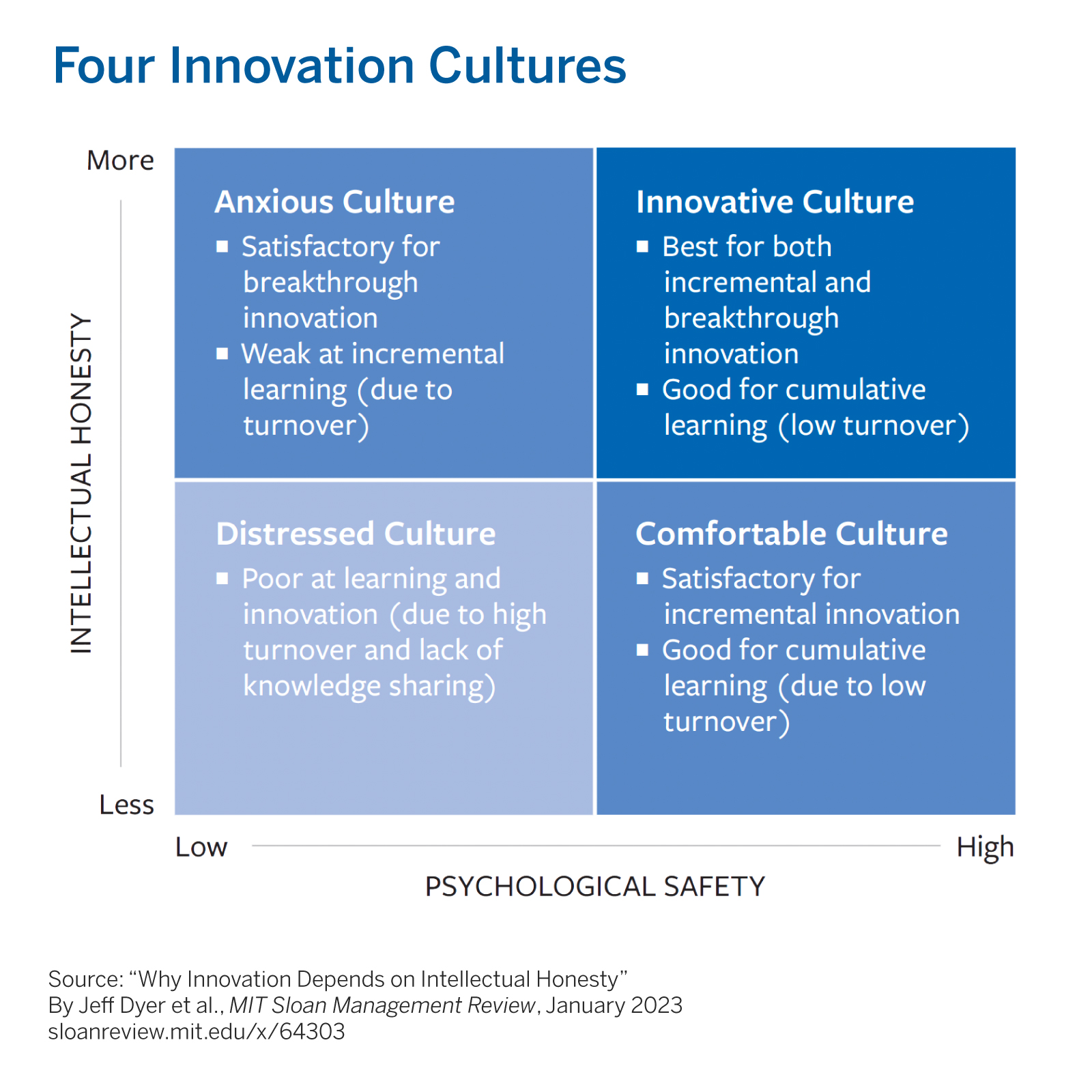
This should be obvious but the free exchange of ideas always depends on intellectual honesty and that is necesasary to advance innovation.
Way more important than all that is access to useful voices and as many as possible. That is the real secret of the RULE of TWELVE.
somewhere out there someone has a real clue that changes it all.

New MIT SMR Research Shows Psychological Safety Isn’t Enough, Innovation Depends on Intellectual Honesty
CAMBRIDGE, Mass., Jan. 17, 2023 — New research released today in MIT Sloan Management Review reveals that many organizations prioritize psychological safety without realizing that the social cohesion it promotes can undermine intellectual honesty and therefore hamper innovation. Balancing psychological safety with intellectual honesty significantly increases a team’s ability to innovate — particularly to create breakthrough innovations — because it unleashes the knowledge of team members.
“Psychological safety and intellectual honesty can sometimes work against each other,” says Jeff Dyer, coauthor of Why Innovation Depends on Intellectual Honesty and the Horace Beesley Distinguished Professor of Strategy at Brigham Young University. “When people are candid in discussions, it can make people feel less safe. But a focus on social cohesion and making people feel safe can undermine honest, candid debate. The challenge for most leaders is to learn how to be more like Mr. Spock by promoting candid debate on the problems the team needs to solve in a hyperrational, non-biased way that defuses interpersonal conflict.”
Assessing the cultures of teams, the authors identify four different team innovation cultures — anxious, comfortable, distressed, and innovative — and detail how each will influence a team’s ability to innovate as well as the kinds of innovations they will excel at.
Based on their research of teams in technology startups and established companies across industries, the authors of “Why Innovation Depends on Intellectual Honesty” identify five rules to fast-track intellectual honesty and outline four principles that are most important to achieving a balanced, innovative, high-performance team culture.
Principle 1: Foster emotional intelligence. Social awareness and relationship management are extremely important to encourage debate without destroying psychological safety.
Principle 2: Hire and develop proactive employees. Personal initiative is the most important individual trait in predicting whether someone will offer their ideas or raise questions.
Principle 3: Legitimize and encourage honesty. Task conflict within teams leads to more entrepreneurial strategies, more innovation, and higher performance.
Principle 4: Subordinate egos to unifying goals. The ability to package disagreement with respect is key to preserving psychological safety while ensuring intellectual honesty.
“Being able to be candid but not brutal may be the missing ingredient that teams need for innovation to prosper,” added Dyer. “Steve Jobs was, in his own words, ‘brutally honest,’ but that honesty tended to destroy psychological safety. When leaders can set aside their egos and invite scrutiny of their own ideas in a respectful, rational way, intellectual honesty will follow.”
A short team innovation culture assessment is included in “Why Innovation Depends on Intellectual Honesty” for leaders to survey their teams’ levels of psychological safety and intellectual honesty.
The Research
The authors surveyed teams in more than 60 technology startups and established companies in a variety of industries to understand the interaction between psychological safety and intellectual honesty and the extent to which they are essential to fostering innovation. To measure psychological safety, they used the survey questions developed by Amy Edmondson for her study published in Administrative Science Quarterly. To measure intellectual honesty, they developed questions based on their interviews with dozens of teams, as well as the existing management research on employee voice in organizational change.
The MIT Sloan Management Review (MIT SMR) article “Why Innovation Depends on Intellectual Honesty” publishes at 8 a.m. ET on Jan. 17, 2023.
About the Authors
Jeff Dyer is the Horace Beesley Distinguished Professor of Strategy at Brigham Young University. Nathan Furr is a professor at INSEAD in Paris. Curtis Lefrandt is cofounder and CEO of Innovator’s DNA, a consulting firm. Taeya Howell is an assistant professor of organizational behavior and human resources management at Brigham Young University. Dyer and Furr coauthored The Innovator’s Method (Harvard Business Review Press, 2014) and, along with Lefrandt, coauthored Innovation Capital (Harvard Business Review Press, 2019).
About MIT Sloan Management Review
MIT Sloan Management Review (MIT SMR) is an independent, research-based magazine and digital platform for business leaders, published at the MIT Sloan School of Management. MIT SMR explores how leadership and management are transforming in a disruptive world. We help thoughtful leaders capture the exciting opportunities — and face down the challenges — created as technological, societal, and environmental forces reshape how organizations operate, compete, and create value.

No comments:
Post a Comment